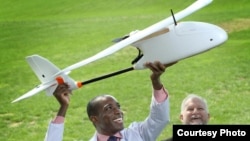Doctors usually want to run tests on blood samples as quickly as possible, before they start to degrade. As it turns out, such a practice may not be necessary. Scientists conducting experiments with a small drone have found that blood samples remained fresh after being airborne for 40 minutes.
The possibility that biological samples could be transported safely from remote areas in Africa and other countries to state-of-the-art laboratories for testing is good news, said Timothy Amukele, a pathologist at the Johns Hopkins University School of Medicine in Baltimore, Maryland. He's been working with Uganda’s Makerere University on the drone project.
Where ground-based transportation stops, Amukele said, hobby-size drones do not.
“In places where you have landslides and mudslides and no roads or terrible traffic or some kind of natural disaster that takes out roads, they’re not affected by those issues at all,” he said.
Blood samples are very delicate and can degrade easily if they sit for too long, as might happen if they get stuck in traffic. They can also be damaged by sudden acceleration, as might happen when a drone is launched.
So, Amukele and his colleagues came up with a simple idea. “We designed a study to answer a question: Can drones be used to transport blood samples?” he said.
The answer is yes.
The investigators collected six blood samples from 56 healthy adults at the Johns Hopkins hospital, and the samples were driven to a drone flight site one hour away. Half the samples were packaged for the flight to protect them from leakage and the in-flight environment, including a rise in temperature. The samples were loaded onto the drone, which Amukele and his team launched on several flights, lasting six to 38 minutes.
The remaining samples were taken back to the lab without ever being flown. Amukele said both sets of samples were then tested.
“We measured the 33 most common lab tests in both sets of blood samples and we compared them. And they were essentially the same. So what that tells us is that blood samples can be flown in drones without any concern of deteriorating them,” he said.
The findings were published in PLoS One.
Amukele said there are a number of advantages to using small, remote-control drones: They can travel 100 kilometers in under an hour, they are less expensive than vehicles like motorcycles and they will not get stuck in traffic.
The next step is to conduct a pilot study in Africa, where point-of-care clinics are sometimes dozens of kilometers away from hospitals where biological samples can be tested.




